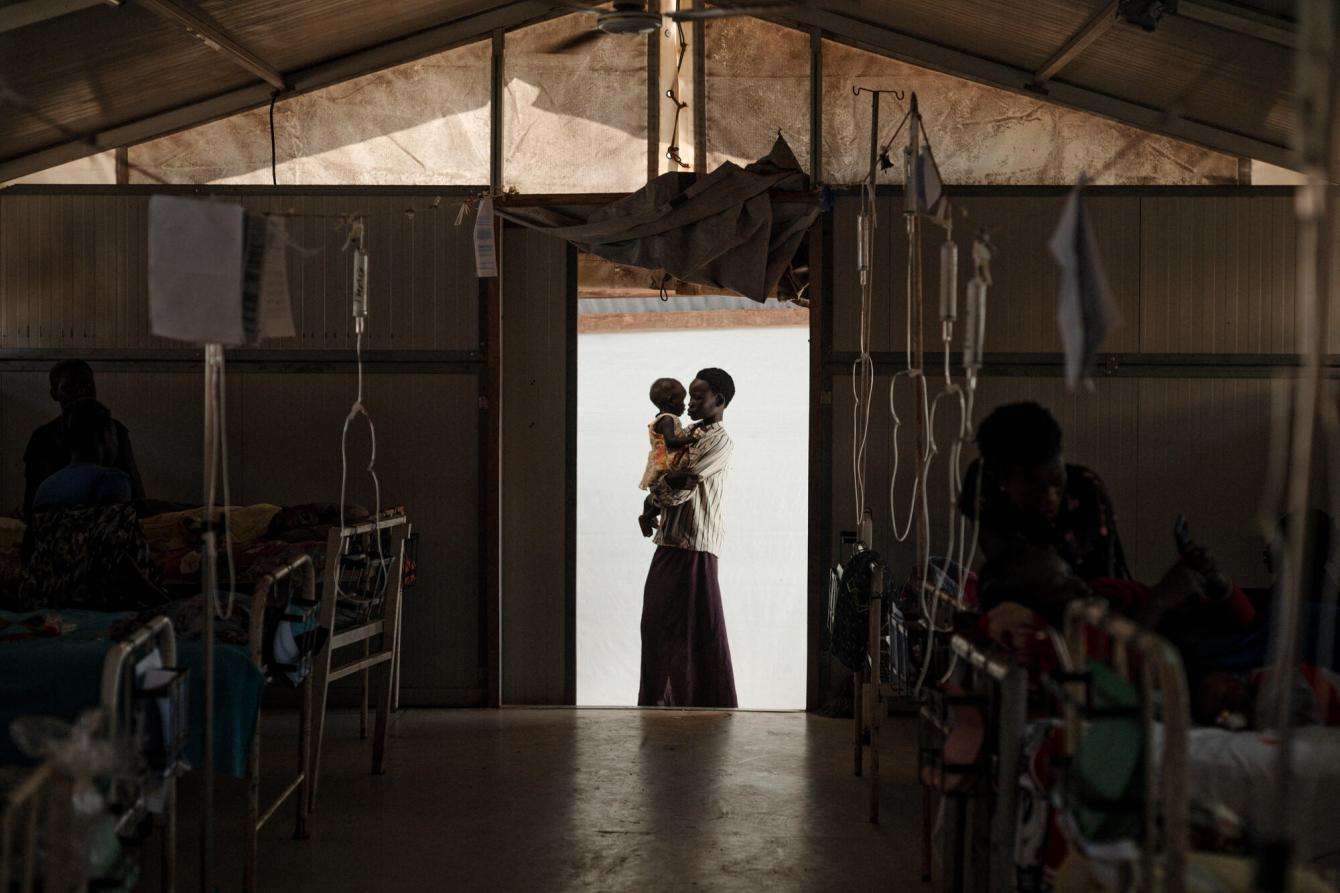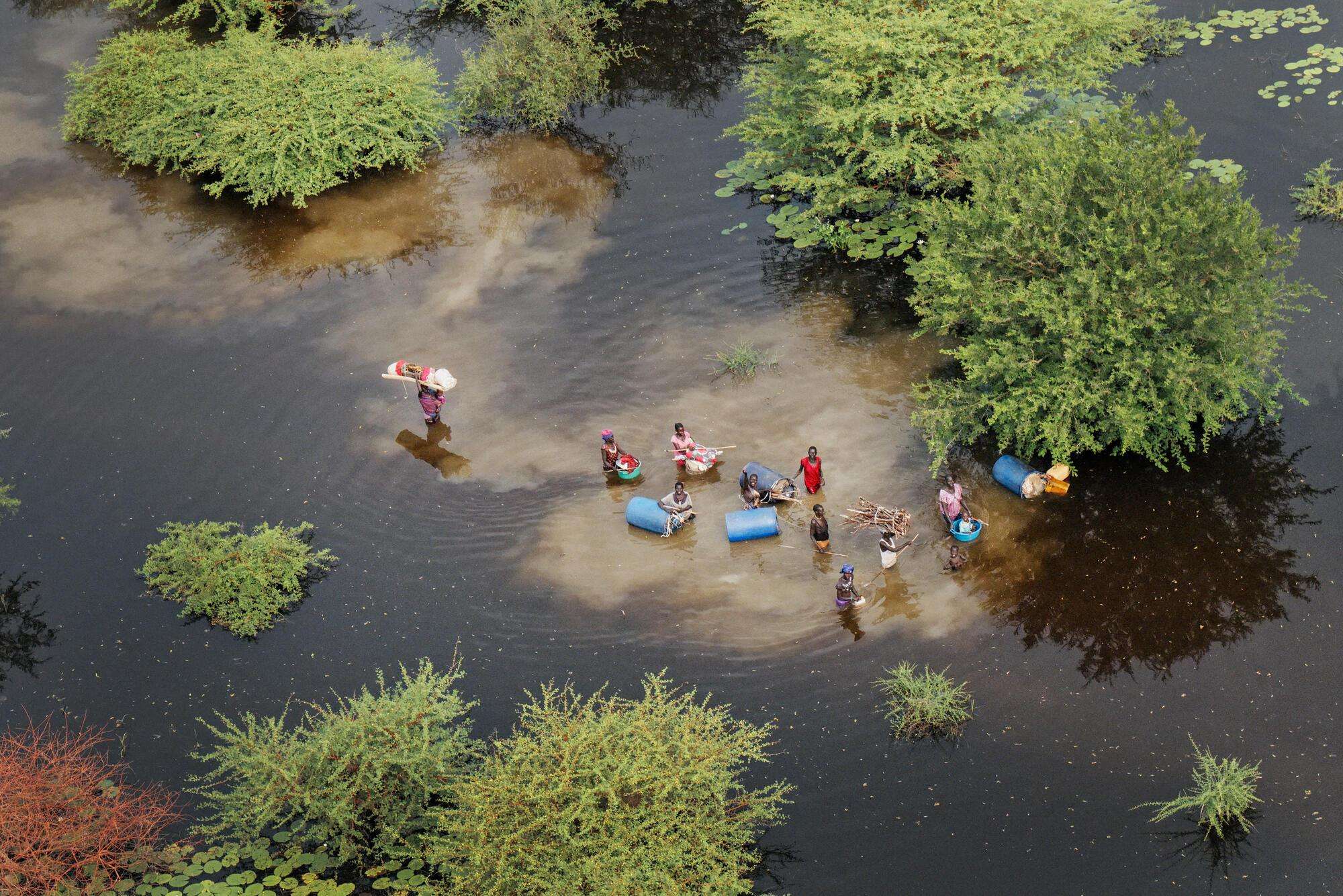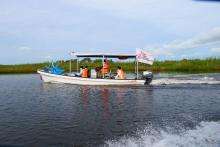When the floodwater levels started rising in her village, 21-year-old Nyabeel* (name changed to protect identity) and her husband were torn about what to do. Leaving their land, which they relied on for food, was a tough decision. “We spent three days moving. It was challenging, with four children and a herd of goats,” she said.
Eight months on since flooding began, people in Unity State, northern South Sudan, continue to suffer, stuck in poor living conditions and at risk of outbreaks of infectious and waterborne diseases. Spread across several makeshift camp sites, they face food insecurity, loss of income, malnutrition, and a lack of safe drinking water. According to the UN Office for the Coordination of Humanitarian Affairs, an estimated 835,000 people have been affected, especially in Jonglei, Unity, and Upper Nile states. The UN reports that this is the worst flooding emergency in decades.
Doctors Without Borders/Médecins Sans Frontières (MSF) runs a hospital in the Bentiu camp for internally displaced people, a former United Nations Protection of Civilians site and the biggest camp for people forced to flee their homes by recent civil wars. Our teams have seen an 80 percent increase in admissions to MSF’s inpatient therapeutic feeding center (ITFC). As a result, we have opened a third ITFC ward and are also running mobile clinics that visit camps in and around Mayom region, Bentiu, and Rubkona, responding to malaria, malnutrition, and acute watery diarrhea.
In her village, Nyabeel had relied on cultivating her land and milk from her goats for food. “We had a more stable life than the one here, now we eat one meal a day of maize,” she said.
Nyabeel had brought her one-year-old to MSF’s mobile clinic in Kuermendoke camp, Rubkona town, for treatment of severe malnutrition and essential vaccinations. Kuermendoke is one of three camps that have a high percentage of children under five suffering from severe acute malnutrition. “Our nutritional survey demonstrated that the severe acute malnutrition prevalence in the camps is well above the World Health Organization’s two percent emergency threshold,” said Dr. Reza Eshaghian, medical team leader for MSF’s emergency flood response.
“When you walk through the camps, you see malnourished children, people collecting dirty flood water to drink, cattle collapsing, and their carcasses everywhere,” said Dr. Eshaghian. “Such poor conditions are harming people’s health.”
Initial studies by the Food and Agriculture Organization of the UN suggest about 65,000 hectares of cultivated land have been damaged due to floods, while over 800,000 livestock died across eight of South Sudan’s 10 states. Having lost so much of their cattle, many displaced women are resorting to collecting firewood to make an income. But increasing prices are making it more difficult for displaced people to buy food.

It’s also become almost impossible for most of the displaced people to find safe drinking water. “Our only source of water for drinking, cooking, and washing is the floodwater,” said Nyapal, a mother of four.
Before the flooding around Bentiu, sanitation facilities in the camp were already in a critical condition and rarely maintained. “For a while, flooding meant it was impossible to access the waste treatment ponds,” said Cawo Yassin Ali, water and sanitation team leader in MSF’s emergency team deployed for the flood response. “This led to an accumulation of sewage in the camp latrines, which then overflowed into the open sewer canals, where children frequently play.” To reduce the risk of disease outbreaks, MSF has set up a sewage treatment plant inside the camp to contain and treat waste.
With the water levels slowly starting to recede around Bentiu, it’s still not clear when Nyabeel, Nyapal, and thousands of other displaced people will be able to return home. “We don’t have anything here, we came empty-handed, the village is covered with water, and we don’t know when it will dry,” said Nyabeel.

Until people can return home, they will be forced to continue living in such precarious conditions. This poses an added challenge for humanitarian actors, requiring them to balance responding to immediate needs with the protracted nature of this crisis and meeting corresponding standards beyond the initial emergency threshold.
“There are immense needs, including the need for proper shelters, clean water, and sanitation infrastructure, quality health care, food security, and livelihood support,” said Dr. Eshaghian. “Humanitarian actors, donors, and the South Sudanese government need to act now, before it is too late. They cannot afford to wait any longer.”
MSF has been working in South Sudan since 1983, currently operating more than 14 projects across the country to deliver lifesaving medical services to communities in need, including some of our biggest programs worldwide. Our teams provide both basic and specialized health care and respond to emergencies and outbreaks affecting isolated communities, internally displaced people, and refugees from neighboring Sudan. MSF teams continue to run COVID-19 pandemic preparedness activities and work in collaboration with the Ministry of Health.


